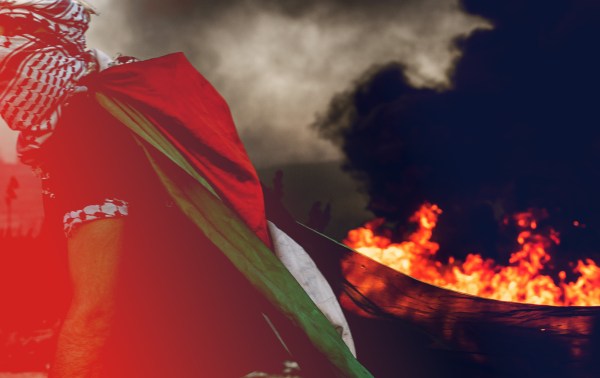The Israeli-Palestinian conflict has raged for generations, and all previous attempts at resolution have failed.
In fact, not only have these efforts failed, but the situation on the ground has steadily deteriorated since the less hopeless days of the Palestinian Liberation Organization’s Yasser Arafat and Israeli Prime Minister Yitzhak Rabin shaking hands on the White House lawn. Since then, the peace process stalled, then collapsed, dragged down by terrorists, assassins, and political inertia. And so a generation of young people on both sides have grown up in a landscape shaped by conflict, blockades, separation, and now war.
It is often said (and just as frequently misattributed to Albert Einstein) that the definition of insanity is doing the same thing over and over again and hoping for different results. It’s unsurprising that, after so many failed peace talks, people look for alternatives to a two-state solution.
The trouble is that none of the alternatives are plausible. Neither the Israeli people nor the Palestinian people are going anywhere. Nor are they willing to surrender their identity or land. Both are extraordinarily passionate about the righteousness of their causes.
John Aziz“The status quo harms Israel’s security and threatens its legitimacy, and it makes a normal life impossible for Palestinians.”
Kevin D. Williamson“There is an alternative, the one nobody likes but the one we are likely to have for a long time: the status quo.”
Let’s consider the status quo. After the failure of the previous peace processes, successive Israeli governments have tried to “manage” the conflict rather than resolve it. The dominant logic became that there was no partner for peace on the Palestinian side, and so Israel focused on security control, deterrence, and separation—through military occupation and settlement expansion in the West Bank, and a blockade on Hamas-ruled Gaza.
For a while, this strategy helped to build the illusion of stability. Israel’s economy grew, emerging as a global tech power and surpassing many European economies in per capita GDP. Normalization agreements were signed with multiple Arab states, including Morocco, Bahrain, and the United Arab Emirates. The conflict was “contained.” Yes, there were skirmishes every few years against Hamas in Gaza, but the West Bank could be pacified through a combination of military presence and economic incentives, and the world, for the most part, would look the other way.
Meanwhile, Hamas focused on militancy, not peacemaking, building up its supplies of rockets, as well as constructing a vast network of tunnels and paramilitary infrastructure in preparation to strike. Rather than pursuing a path toward freedom through negotiation or international recognition, they instead enshrined “resistance” as both a strategy and identity.
Hamas’ vision of “liberation” is not one of equal rights or peaceful coexistence with Israel. It doesn’t have a Martin Luther King Jr. or a Nelson Mandela. This vision is a maximalist dream in which Israel is destroyed, and its Jewish population is either subjugated or ethnically cleansed. The group wants a single Palestinian state from the Jordan River to the Mediterranean. Hamas leaders have openly suggested that Jews should “return to where they came from”—a callous and antisemitic fantasy that ignores both the historical reality of a Jewish ancestral homeland and basic human rights.
But the events of October 7, 2023, and the months since have blown a hole through both Israeli fantasies of “managing the conflict” and Hamas’ fantasies of violently conquering Israel.
The brutal attack by Hamas—massacring more than a thousand Israelis, including hundreds of civilians in their homes and communities—was the single deadliest day for Jews since the Holocaust. It was a catastrophe. What followed was also catastrophic. Yes, Israel’s military response in Gaza has prevented any further incursions by Hamas. But it has also killed tens of thousands of civilians, leveled entire neighborhoods, and displaced nearly 2 million people.
It should be very clear to everyone that the status quo before the war has led to a complete disaster. While Palestinians in Gaza face a humanitarian crisis, Israel is facing a diplomatic one. Support for the war in Gaza has fallen to just 32 percent of Americans, according to a July Gallup poll, with 60 percent disapproving. Worldwide, a Pew survey across 24 countries earlier in 2025 showed most respondents currently hold negative views of Israel and its prime minister.
But instead of reckoning with this, hardliners in Israel and in the Trump administration are promoting the idea of “voluntary relocation” of Palestinians from Gaza. The euphemisms vary—“resettlement,” “emigration,” “clearing the Strip”—but the underlying idea is chillingly clear: Move the population permanently out of Gaza. Some suggest pushing Palestinians into the Sinai Peninsula. Others imagine them being “distributed” to other Arab states.
No doubt, if a civilian wishes to leave temporarily during the war, then by all means they should be able to do so. But intentionally clearing a civilian population and prohibiting their return is reckless, strategically wrongheaded, potentially an act of ethnic cleansing, and will not resolve the conflict. Frankly, it risks turning Israel into a pariah state.
We already have a test case for the ineffectiveness of simply relocating Palestinians. In the 1948 war, up to 700,000 Palestinians were displaced and not allowed to return to the houses and land they lived on in what became the state of Israel. Did they just give up their Palestinian identity or claims? No. Will displacing the Palestinians in Gaza convince them to give up their Palestinian identity or claims? It seems very unlikely. Pushing Palestinians out of Gaza will simply set the stage for another chapter of conflict at some point down the line. And in the West Bank, permanent military occupation without citizenship or equality for Palestinians living there will just breed more resentment and division.
Of course, Israel has a right to exist and a right to security. Delegitimizing and attacking Israel is a dead end. Palestinians also have an equal right to exist and live in security, but Hamas has no right to threaten Jewish people with displacement or subjugation, nor to engage in terror against Israel’s civilian population.
The fact is that nobody is coming to save Hamas. Hamas’ allies like the Houthis in Yemen and the Islamic Republic of Iran are in no position to save it. Israel has already defeated a large part of Hamas, and the wider international community, including Arab states like Saudi Arabia and even Qatar, is firm that Hamas must give up power, disarm, and leave Gaza. This is a reasonable way to end the war.
Hamas remains intractable and unwilling to compromise even on this. In response to this demand, Hamas spokesman Abu Obaida reiterated that Hamas is willing to fight on until death or victory. This is a serious obstacle to peace, and in the short term, they may well fight on for some months or years.
But in the long run, peace, reconciliation, and forgiveness are the best guarantors of security for everyone. That should be the priority—not managing the conflict, but definitively resolving it in a way that will leave both Palestinians and Israelis better off than they are today.
So where does that leave us? If the status quo has collapsed, if Hamas’ “from the river to the sea” is a dead end leading to misery, and if ideas of mass expulsion are not only immoral but unworkable, what remains?
All that is left is going back to the two-state solution and preparing the ground for Palestinian independence. Neither side wants to cancel or merge its national identity. If there is a better solution that both sides can agree on, and that will deliver mutual dignity and a better life for everyone, then by all means, I will not oppose that.
But as far as I can see, the easiest and least painful compromise for both sides is two states. No doubt, there will be challenges. As it stands, there is no functioning Palestinian government that can speak for all Palestinians. Although it has gained widespread recognition from more than 100 countries and is a United Nations observer member today, the Palestinian Authority remains weak, fragmented, deeply unpopular, and hasn’t even attempted to hold an election in decades.
But dysfunction is not destiny. What’s needed now is redevelopment and rebuilding. Palestinian capacity must be built over time, just as it was for other national movements that were once seen as ungovernable or irreparably divided.
Furthermore, there must be security measures in place to preserve the peace and prevent a return to war. This will be a complex and intricate undertaking, and will require the involvement of external peacekeeping forces and the total disbanding of terrorist groups. It will also require curricula in Palestinian schools that teach coexistence, not conflict or hate.
This will take a lot of work. We need leaders—on both sides—who are willing to put their people’s future ahead of their own political survival. We need leaders who are willing to work together to create a better future for everyone.
Opposing Debate
Yes, it’s hard. But the alternatives are worse. Cyclical outbursts of war and terror undermine the entire region. The status quo harms Israel’s security and threatens its legitimacy, and it makes a normal life impossible for Palestinians.
The outlines of peace are already on the table. They have been for many decades. The challenge is building the trust, legitimacy, and political space to make it possible. That work must begin now. It’s not guaranteed to succeed any time soon. In fact, things may get worse before they start to get better. It took many years to get into this quagmire, and it likely will take years more to get out.
But our destiny as Palestinians is tied to Israel’s own destiny. We can continue to be enemies locked in a mortal embrace, or we can become neighbors—and even, one day, friends.





Please note that we at The Dispatch hold ourselves, our work, and our commenters to a higher standard than other places on the internet. We welcome comments that foster genuine debate or discussion—including comments critical of us or our work—but responses that include ad hominem attacks on fellow Dispatch members or are intended to stoke fear and anger may be moderated.
With your membership, you only have the ability to comment on The Morning Dispatch articles. Consider upgrading to join the conversation everywhere.